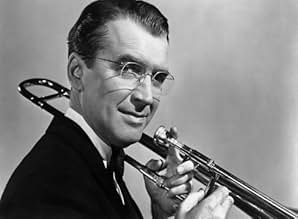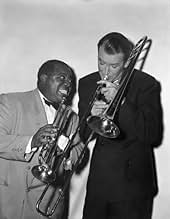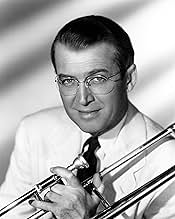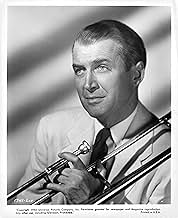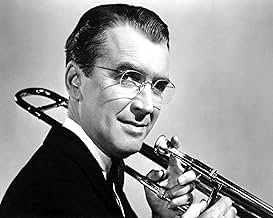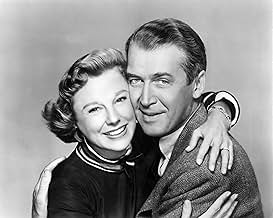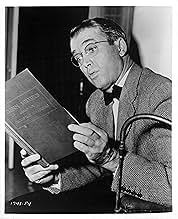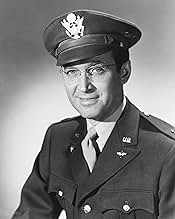CALIFICACIÓN DE IMDb
7.3/10
10 k
TU CALIFICACIÓN
Biografía del director de orquesta Glenn Miller desde sus inicios hasta su muerte en el Canal de la Mancha en diciembre de 1944.Biografía del director de orquesta Glenn Miller desde sus inicios hasta su muerte en el Canal de la Mancha en diciembre de 1944.Biografía del director de orquesta Glenn Miller desde sus inicios hasta su muerte en el Canal de la Mancha en diciembre de 1944.
- Dirección
- Guionistas
- Elenco
- Ganó 1 premio Óscar
- 1 premio ganado y 7 nominaciones en total
Harry Morgan
- Chummy
- (as Henry Morgan)
Katherine Warren
- Mrs. Burger
- (as Katharine Warren)
- Dirección
- Guionistas
- Todo el elenco y el equipo
- Producción, taquilla y más en IMDbPro
Opiniones destacadas
Not their best collaboration, my personal favourite is 'Winchester 73', but of the ones personally seen (not all but most) 'The Glenn Miller Story' is up there among their better ones. While there's more to see of their collaborations, none of the ones seen are less than good.
Biopics are very difficult to get right, especially ones of famous people in entertainment (i.e. film) and music (composing, singing, playing instruments). For example often coming to life when in action (whether acting, singing, composing or playing), but some suffer from the biographical elements not faring as good, with a tendency to play fast and loose with the facts. There are some great ones, some good ones, some uneven ones and some hugely problematic ones.
Luckily, 'The Glenn Miller Story' is one of the near-great ones. On a musical front it is nothing short of exceptional, no complaints there, but it was thoroughly enjoyable as a biopic too regardless of it not being a true account and very scratch surface because of not suffering from pacing or tone problems. Stewart is note-perfect in a role that plays to his strengths, despite him portraying a big band icon Stewart not only plays Miller with utter conviction but the performance also epitomises everything that Stewart himself is about and what made him such a great actor.
'The Glenn Miller Story', when it comes to Mann is very much removed from his darker and more psychological westerns that also star Stewart (the films that he's perhaps chiefly famous for), but there is not once a sense that he is beyond his comfort zone in an atypical genre for him, far from it. To me, actually, even with a lighter touch (much needed), without it ever feeling too much, it is one of Mann's stronger overall directorial efforts when it comes to his collaborations with Stewart.
As said to be expected, the music is exceptionally bewitching, with all the hits included and it was so wonderful to hear so many classics in one film. This said, 'The Glenn Miller Story' does have much more than a great performance and music. As well as June Allyson personifying charm and spunk, the supporting cast are just as good, with a superb Harry Morgan and cracking appearances from Louis Armstrong, Gene Krupa, The Modernaires and Frances Langford. The chemistry between Stewart and Allyson is irresistible, and 'The Glenn Miller Story' is handsomely mounted and beautifully filmed with lavish use of colour.
Script-wise, 'The Glenn Miller Story' a vast majority of the time succeeds, with a nice and well balanced dose of humour that makes one feel good and tender sentiment, while the story's warm heart and bags of charm more than makes up for any misgivings of it being inaccurate and only scratching the surface. Really liked the characters and felt myself caring for them.
My only complaints really are the rather too sudden ending that should have been more sombre and the central relationship being portrayed somewhat too perfectly and sugar coated, which does despite the irresistible chemistry mean that parts do fall into saccharine-overboard camp occasionally.
In conclusion, a near-great film and it is easy to see why of all Stewart and Mann's collaborations 'The Glenn Miller Story' is generally one of the more fondly remembered ones. 8/10 Bethany Cox
Biopics are very difficult to get right, especially ones of famous people in entertainment (i.e. film) and music (composing, singing, playing instruments). For example often coming to life when in action (whether acting, singing, composing or playing), but some suffer from the biographical elements not faring as good, with a tendency to play fast and loose with the facts. There are some great ones, some good ones, some uneven ones and some hugely problematic ones.
Luckily, 'The Glenn Miller Story' is one of the near-great ones. On a musical front it is nothing short of exceptional, no complaints there, but it was thoroughly enjoyable as a biopic too regardless of it not being a true account and very scratch surface because of not suffering from pacing or tone problems. Stewart is note-perfect in a role that plays to his strengths, despite him portraying a big band icon Stewart not only plays Miller with utter conviction but the performance also epitomises everything that Stewart himself is about and what made him such a great actor.
'The Glenn Miller Story', when it comes to Mann is very much removed from his darker and more psychological westerns that also star Stewart (the films that he's perhaps chiefly famous for), but there is not once a sense that he is beyond his comfort zone in an atypical genre for him, far from it. To me, actually, even with a lighter touch (much needed), without it ever feeling too much, it is one of Mann's stronger overall directorial efforts when it comes to his collaborations with Stewart.
As said to be expected, the music is exceptionally bewitching, with all the hits included and it was so wonderful to hear so many classics in one film. This said, 'The Glenn Miller Story' does have much more than a great performance and music. As well as June Allyson personifying charm and spunk, the supporting cast are just as good, with a superb Harry Morgan and cracking appearances from Louis Armstrong, Gene Krupa, The Modernaires and Frances Langford. The chemistry between Stewart and Allyson is irresistible, and 'The Glenn Miller Story' is handsomely mounted and beautifully filmed with lavish use of colour.
Script-wise, 'The Glenn Miller Story' a vast majority of the time succeeds, with a nice and well balanced dose of humour that makes one feel good and tender sentiment, while the story's warm heart and bags of charm more than makes up for any misgivings of it being inaccurate and only scratching the surface. Really liked the characters and felt myself caring for them.
My only complaints really are the rather too sudden ending that should have been more sombre and the central relationship being portrayed somewhat too perfectly and sugar coated, which does despite the irresistible chemistry mean that parts do fall into saccharine-overboard camp occasionally.
In conclusion, a near-great film and it is easy to see why of all Stewart and Mann's collaborations 'The Glenn Miller Story' is generally one of the more fondly remembered ones. 8/10 Bethany Cox
It is said that Miller could never remember precisely the moment he decided to emphasize his new reed section sound... But it was during this disheartening interim, that he realized the unique sound, produced by the clarinet holding the melodic line while the tenor sax plays the same note, and supported harmonically by three other saxophones - just might be the individual and easily recognizable style that would set his band apart from all the rest...
Photographed in color, Anthony Mann's 'The Glenn Miller Story' is purely a time trip to those years, when Glenn Miller's band ruled the record charts and anchored the airwaves... The film, beautifully captured Miller's spirit and follows his life story with reasonable fidelity... It is one of the most charming and touching musical biography...
Appearing in glasses and winning grin, Stewart kisses Allyson, holding her face lightly with his fingers, the same way he detains his trombone slide... Stewart applied his natural musical expertise, playing on the trombone... Miller's style was there. The original sound was there. The real music was there. The mix was there...
The film traces Miller's romance and marriage to his college sweetheart, Helen Burger, and his progress from a free-lance trombonist and arranger to band leader...
The pop music styles of '20s sweet and jazz bands were getting ready for the Big Band or Swing era of the '30s... About this time, Miller began writing charts that would one day to be his band's stock in fame, the clarinet "lead" sound over the saxophones... Miller's imagination, strong will, and determination kept his aspirations alive.. His music, a careful mixture of swing, jazz, and improvisation, flowed like spring with matchless string of hit records ( "Moonlight Serenade," "String of Pearls," "Pennsylvania 6-5000", "Little Brown Jug," "In the Mood," & "Chattanooga Choo Choo," among others...
The constant impact of radio broadcasts, and the drawing power at dance pavilions built and sustained the momentum of Miller's popularity...
June Allyson, who regularly played the little, lip-quivering waiting wife, again she is the petite and husky-voiced woman who, once married, is supportive and inspirational.. She finances Glenn what he needs to start his own band... Her scenes with Stewart have such a natural, easy-going on the screen, that we get completely drawn into their lives... Also featuring in the film are such legendary figures as Frances Langford, Gene Krupa, and Louis Armstrong...
With its unique jazz sound, 'The Glenn Miller Story' is a competent musical heart warmer with a well-cast star and successful reproduction of the Miller sound...
Photographed in color, Anthony Mann's 'The Glenn Miller Story' is purely a time trip to those years, when Glenn Miller's band ruled the record charts and anchored the airwaves... The film, beautifully captured Miller's spirit and follows his life story with reasonable fidelity... It is one of the most charming and touching musical biography...
Appearing in glasses and winning grin, Stewart kisses Allyson, holding her face lightly with his fingers, the same way he detains his trombone slide... Stewart applied his natural musical expertise, playing on the trombone... Miller's style was there. The original sound was there. The real music was there. The mix was there...
The film traces Miller's romance and marriage to his college sweetheart, Helen Burger, and his progress from a free-lance trombonist and arranger to band leader...
The pop music styles of '20s sweet and jazz bands were getting ready for the Big Band or Swing era of the '30s... About this time, Miller began writing charts that would one day to be his band's stock in fame, the clarinet "lead" sound over the saxophones... Miller's imagination, strong will, and determination kept his aspirations alive.. His music, a careful mixture of swing, jazz, and improvisation, flowed like spring with matchless string of hit records ( "Moonlight Serenade," "String of Pearls," "Pennsylvania 6-5000", "Little Brown Jug," "In the Mood," & "Chattanooga Choo Choo," among others...
The constant impact of radio broadcasts, and the drawing power at dance pavilions built and sustained the momentum of Miller's popularity...
June Allyson, who regularly played the little, lip-quivering waiting wife, again she is the petite and husky-voiced woman who, once married, is supportive and inspirational.. She finances Glenn what he needs to start his own band... Her scenes with Stewart have such a natural, easy-going on the screen, that we get completely drawn into their lives... Also featuring in the film are such legendary figures as Frances Langford, Gene Krupa, and Louis Armstrong...
With its unique jazz sound, 'The Glenn Miller Story' is a competent musical heart warmer with a well-cast star and successful reproduction of the Miller sound...
Glenn Miller's rise to fame and the tragedy that took him from us at the height of his career makes for a wonderfully entertaining film.
This film is rich because of the wonderful performances of James Stewart as the band leader and June Allyson, the latter was just made for the picture. She captures the depth of a devoted wife and we all can just cry with her when her happiness was ended so suddenly.
Naturally, the supporting cast of musicians and scenes with Frances Langford, Louis Armstrong and Gene Krupa are just wonderful.
We view Miller from humble beginnings to stardom, the old-fashioned Hollywood Way-he earned it by hard work and perseverance as he went through life looking for that sound.
My main flaw with this film. Just like Miller's life, it ended too suddenly. It could have gone on and on while we all danced the night away in tribute to this find musician.
Ever Harry Morgan's tear in the end tells you what this was all about.
This film is rich because of the wonderful performances of James Stewart as the band leader and June Allyson, the latter was just made for the picture. She captures the depth of a devoted wife and we all can just cry with her when her happiness was ended so suddenly.
Naturally, the supporting cast of musicians and scenes with Frances Langford, Louis Armstrong and Gene Krupa are just wonderful.
We view Miller from humble beginnings to stardom, the old-fashioned Hollywood Way-he earned it by hard work and perseverance as he went through life looking for that sound.
My main flaw with this film. Just like Miller's life, it ended too suddenly. It could have gone on and on while we all danced the night away in tribute to this find musician.
Ever Harry Morgan's tear in the end tells you what this was all about.
Produced nine years after his death this is Hollywood's obituary of swing era legend Glenn Miller. Essentially a musical told around the story of his struggle to achieve musical stardom. A film that will appeal to all lovers of 1930s swing music and Glenn Miller in particular. A film also for James Stewart fans. Casting the gangling Stewart as Miller was a huge gamble that succeeded; if it had failed so would have the film. This success was due to Anthony Mann's undoubted ability as a director. The Mann-Stewart combination had already proved itself but here both were on unfamiliar territory. Mann's forté was the outdoor adventure while Stewart was a pre-war light comedy star still trying to find a new identity. Mann had earlier directed Stewart in Winchester '73(1950)and the two were to go on to further success with The Far Country (1954) and The Man from Larramie (1955). He excels himself in bringing out previously unknown talents in Stewart that make this a career best for the Actor. Clad simply in a military raincoat, a trombone to his lips and sporting a USAAF officer's peaked cap he requires no further make-up to pass himself off as the wartime Miller. Among the lesser credits is the name of an unknown Henry Mancini but this was to be his big break as at the young age of 22 he was to become an Oscar nominee (jointly with Joseph Gershenson) for musical scoring. Before joining Universal Mancini had been a piano player and arranger with the post-war "Glenn Miller Orchestra", by using musicians from this band, made up mainly of sidesmen from Miller's own bands, Mancini ensured an authentic re-creation of the seductive Miller sound that had enchanted teenagers in the years leading up to the war. Regrettably an argument with the Miller Estate prevented the participation of saxophonist Ted Beneke, who had earlier led the post-war band and was renowned for his performance of Chattanoga Choo-Choo in"SunValley Serenade" (1941). The fidelity of the sound track of Miller's music won the film an Oscar for best sound recording of a musical. After a ponderous start the film picks up pace in apparent tune with Miller's success until the last reel is a non-stop performance of Miller standards. Miller was supported throughout by his wife, Helen, sympathetically played by a cuddlesome June Allyson, who ceaselessly encouraged him when all seemed to have failed. When news of his death reaches her one immediately feels her sadness in her loss and spontaneously grieves with her. Get your hankies out! A few minor lapses mar an otherwise competent production; Miller is incongruously seen in his army raincoat an a glorious summer's day conducting his wartime band at an outdoor concert in England just after D-day while the audience and band are in standard military attire; a continuity lapse shows a German flying bomb attack taking place before D-day, 6th June, whereas the first one did not reach England until the following week. Miller's loss at the peak of popularity, flying in advance of his band to make arrangements in Paris for his Christmas concert, ensured his enduring fame. As his plane and body were never recovered the mystery of his death has added to the legend. Only in the last decade have military historians been able to piece together his last moments and pinpoint where the plane came down. Whilst crossing the English Channel in dense fog the plane, which relied entirely on a compass for navigation, wandered off course and entered a prohibited area reserved for returning Allied bombers to drop any left over bombs; it was one of these that hit the plane so bringing to its end the life of one Glenn Alton Miller. Anthony Mann's deliberately abrupt end to the film comes as a jolt and dramatically conveys the unexpected loss of the patriotic Miller in his prime - the touch of the Master. A film that has stood the test of time; part fact, part fiction, it will remain the definitive tribute to the man and his music. Good wholesome entertainment for the whole family and a must for Stewart and Miller fans.
The Glenn Miller Story is a biographical tribute to a man who is always ranked as one of the great swing bandleaders of the late thirties to middle forties era. It is indeed fortunate that when James Stewart puts a pair of glasses on, he does actually look like the real Glenn Miller. I don't know what Helen Miller looked like, but I'm sure she was as supportive to her husband as June Allyson was to her screen hubby.
The Miller story begins with Stewart and pal Harry Morgan on the road as musicians. Stewart plays a slide trombone and has ideas of how the orchestra should sound as a whole. He spends a lot of time writing arrangements for the entire band. When they're not done right as is graphically shown in a scene when Miller's famous Moonlight Serenade is performed, he decides to form his own band.
He's still looking for that particular sound that he wants his orchestra to have and he chances on it in one of the more interesting scenes in the film. Swing fans when they hear it will recognize it as the genuine Glenn Miller.
One glaring fault for purists though is while the instrumentals are performed nicely, the vocal part of the Miller band is left out of the film. For whatever reason singers, Ray Eberle, Marian Hutton (Betty's sister)and most of all Gordon "Tex" Beneke are not in the film. In fact Chattanooga Choo Choo, Beneke's most famous number, is performed in the film by Frances Langford as herself.
My favorite scene in the film is the nightclub scene in Harlem on the Miller wedding night. June was definitely a patient wife, but hey, if you got a chance to jam with Louis Armstrong, you drop EVERYTHING for that opportunity. Gene Krupa and other top jazz musicians are in that scene with Stewart and Satchmo, making it a real treat for jazz aficionados.
For American music we are indeed fortunate that Glenn Miller succeeded in his quest for the right sound which is so lovingly captured in this film.
The Miller story begins with Stewart and pal Harry Morgan on the road as musicians. Stewart plays a slide trombone and has ideas of how the orchestra should sound as a whole. He spends a lot of time writing arrangements for the entire band. When they're not done right as is graphically shown in a scene when Miller's famous Moonlight Serenade is performed, he decides to form his own band.
He's still looking for that particular sound that he wants his orchestra to have and he chances on it in one of the more interesting scenes in the film. Swing fans when they hear it will recognize it as the genuine Glenn Miller.
One glaring fault for purists though is while the instrumentals are performed nicely, the vocal part of the Miller band is left out of the film. For whatever reason singers, Ray Eberle, Marian Hutton (Betty's sister)and most of all Gordon "Tex" Beneke are not in the film. In fact Chattanooga Choo Choo, Beneke's most famous number, is performed in the film by Frances Langford as herself.
My favorite scene in the film is the nightclub scene in Harlem on the Miller wedding night. June was definitely a patient wife, but hey, if you got a chance to jam with Louis Armstrong, you drop EVERYTHING for that opportunity. Gene Krupa and other top jazz musicians are in that scene with Stewart and Satchmo, making it a real treat for jazz aficionados.
For American music we are indeed fortunate that Glenn Miller succeeded in his quest for the right sound which is so lovingly captured in this film.
¿Sabías que…?
- TriviaJames Stewart took trombone lessons in order to actually play during scenes where Glenn Miller is seen performing with his orchestra. However, while learning from his tutor, Stewart's attempts at practicing the instrument made such horrible noises that the teacher reportedly went home in a rage every night to his family. It was decided that Stewart would accurately mime the motions of playing (especially apparent during the performance of String of Pearls) while his trombone tutor Joe Yukl did the actual playing.
- ErroresMiller's famed swing instrumental of "Little Brown Jug" is depicted in the closing scene as a "special arrangement" Glenn created for a Christmas 1944 radio broadcast by Miller's AAF Band from Paris. In fact, it was one of the real Miller Band's first bona fide hits in 1939, arranged by the recently hired Bill Finegan, who became, along with arranger Jerry Gray, two of the key behind-the-scenes craftsmen that helped mold Miller's civilian band into the enduring commercial and artistic powerhouse it became.
- Citas
[repeated line]
Helen Burger: Honestly!
- Versiones alternativasMost current prints in circulation are the slightly shortened 113-minute 1959 re-release version.
- ConexionesFeatured in AFI Life Achievement Award: A Tribute to James Stewart (1980)
- Bandas sonorasBasin Street Blues
(uncredited)
Written by Spencer Williams
Performed by Louis Armstrong and Gene Krupa
Selecciones populares
Inicia sesión para calificar y agrega a la lista de videos para obtener recomendaciones personalizadas
Detalles
Taquilla
- Total a nivel mundial
- USD 994
- Tiempo de ejecución1 hora 55 minutos
Contribuir a esta página
Sugiere una edición o agrega el contenido que falta

Principales brechas de datos
What is the French language plot outline for The Glenn Miller Story (1954)?
Responda


